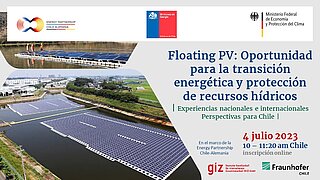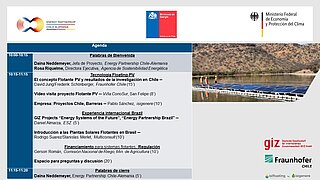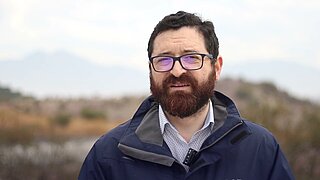Floating PV: Oportunidad para la transición energética y cuido de recursos hídricos

Webinar Floating PV: Opportunity for the Energy Transition and Protection of Water Resources
Floating PV: Oportunidad para la transición energética y protección de recursos hídricos
The webinar discussed opportunities for agriculture and other water-using industries in mitigating the effects of climate change through renewable energy.
After the welcome by Daina Neddemeyer, EP project leader, and Rosa Riquelme, Executive Director of the Energy Sustainability Agency, there were three thematic blocks.
The Floating-PV Technology was presented in the first block by experts from Fraunhofer Chile. One of the advantages of floating PV systems is the lower evaporation on the water surface and higher efficiency of the panels in hot climates thanks to the cooling effect of water. A video was shared of the visit of the Floating PV project of the Conosur vineyard in San Felipe, together with the Minister of Energy Diego Pardow and other officials. Pabló Sánchez, from the company Isigenere, highlighted that one of the obstacles for project development was the absence of specific regulatory frameworks for floating PV in many countries. Some cases are not clearly regulated under the standard PV regulation, for example when water bodies would be needed for firefighting aircrafts in forest fires.
The second block was entitled "International experience Brazil". The GIZ project "Energy Systems of the Future", together with the Energy Partnership Brazil, presented the high potential of Floating Solar Power Plants in Brazil. Exemplary projects were discussed, including combined photovoltaic systems on reservoirs and hydroelectric power plants.
Finally, in the third block "Financing for floating systems", Gerson Román from the National Irrigation Commission presented the policy to promote the development of irrigation projects to include renewable energy supply. He said that the goal in the Energy Agenda 2022-2026 is to increase distributed generation in the agricultural sector for net billing. As of today, 35% of the installed base of distributed generation is in the agricultural sector. The legislative process is currently underway for a new irrigation law, which will provide even more incentives to encourage innovative NCRE technology in irrigation projects. The law recognizes several benefits, such as efficiency improvements, sustainability, security, dual use of land, e.g. it could allow substitution of diesel generation. Finally, emphasis was placed on the Water-Food-Energy Linkage.
The event was organized by the Energy Partnership (EP) Chile-Germany, the Ministry of Energy, the Fraunhofer Research Centre Chile and the GIZ in Brazil, and gathered more than 150 attendees.
Contents:
- The floating PV concept and research results in Chile (Fraunhofer Chile).
- Financing for floating systems, barriers and regulation (Comision Nacional de Riego)
- Projects in Chile (ISIGENERE, Solarity)
- International experience Brazil (GIZ Brazil, Multiconsult)
You can access the recording and the presentations here.
Video: "Floating PV: Oportunidad para la transición energética y protección de recursos hídricos"
Agenda

Presentations (Spanish)
- Fraunhofer: "Flotante PV: Resultados de Investigación y Potencial en Chile" (4 MB, PDF)
- Multiconsult: "Introducción a las Plantas Solares Flotantes en Brasil" (5 MB, PDF)
- GIZ Brasil: "Flotante PV: Oportunidad para la transición energética y protección de recursos hídricos" (481 KB, PDF)
- CNR: "Financiamiento de Obras de Riego con Energías Renovables" (3 MB, PDF)
- ISIGENERE: "Instalaciones solares flotantes sobre balsas de riego" (13 MB, PDF)
The Energy Partnership Chile-Alemania officially started in April 2019, wheen the German Federal Ministry of Economics and Climate Action (BMWK) and the Chilean Ministry of Energy (MEN) signed an Agreement of Cooperation. This Partnership has a full-time secretariat in Santiago de Chile operated by the GIZ (Deutsche Gesellschaft für Internationale Zusammenarbeit GmbH) which is the implementing body of this project.
Video: Visita PLANTA FOTOVOLTAICA FLOTANTE SAN FELIPE
